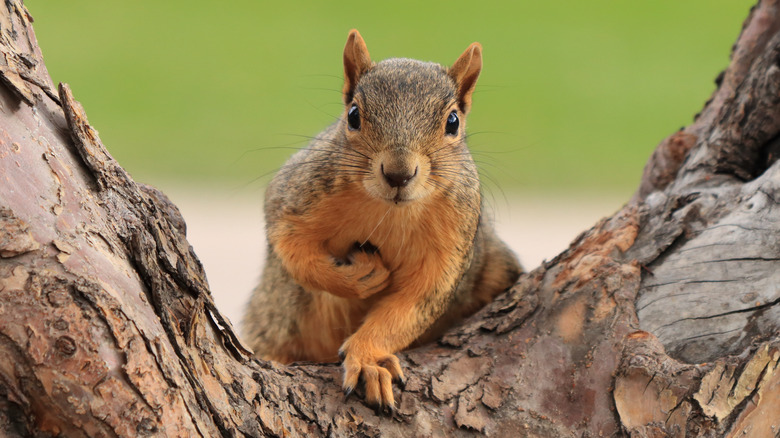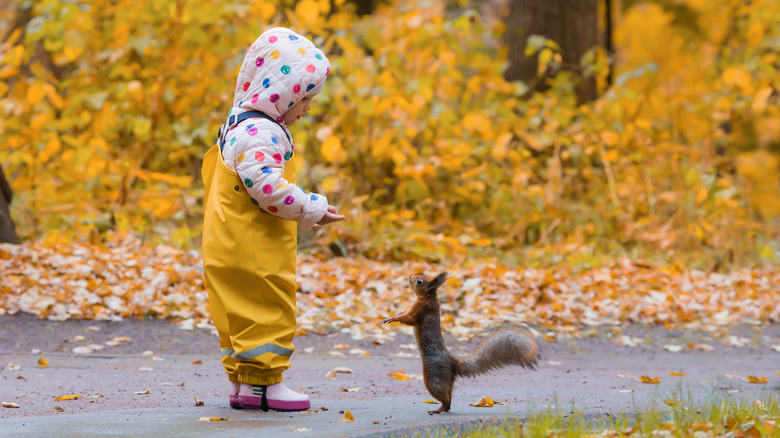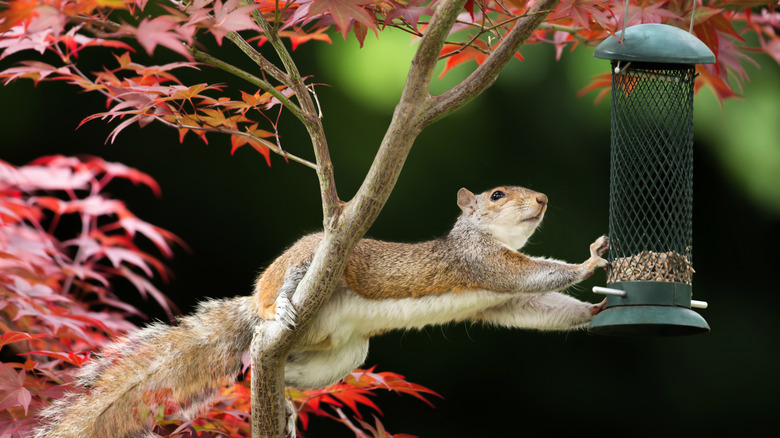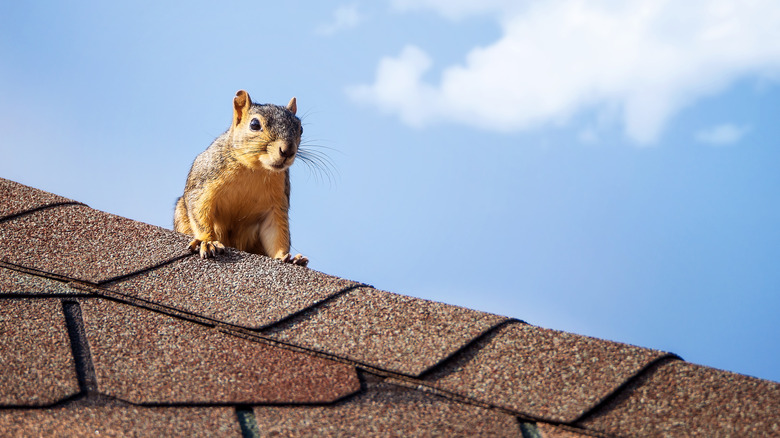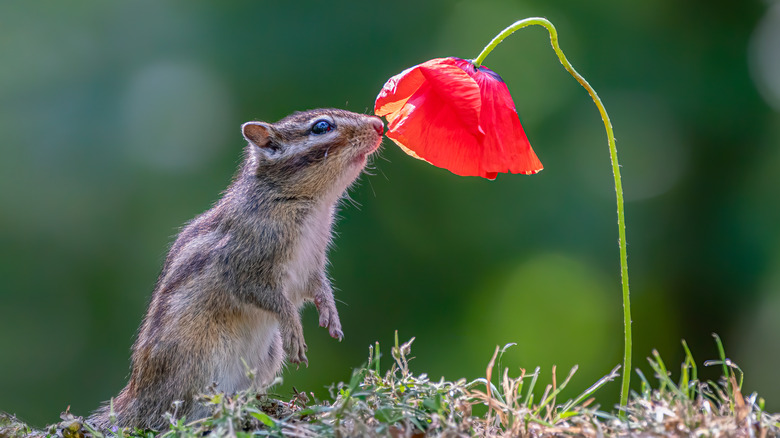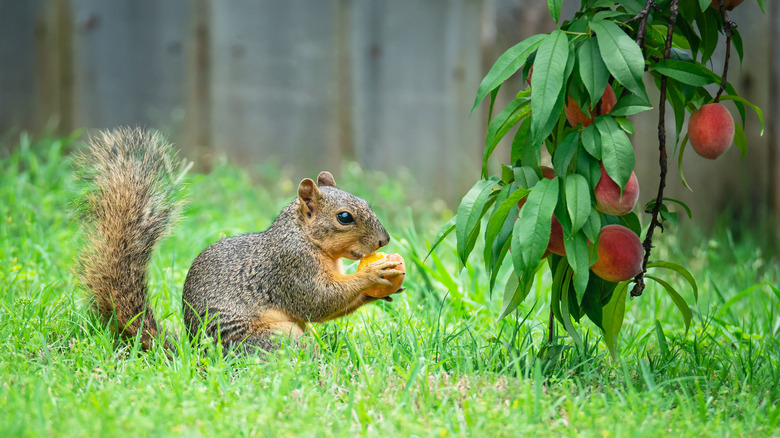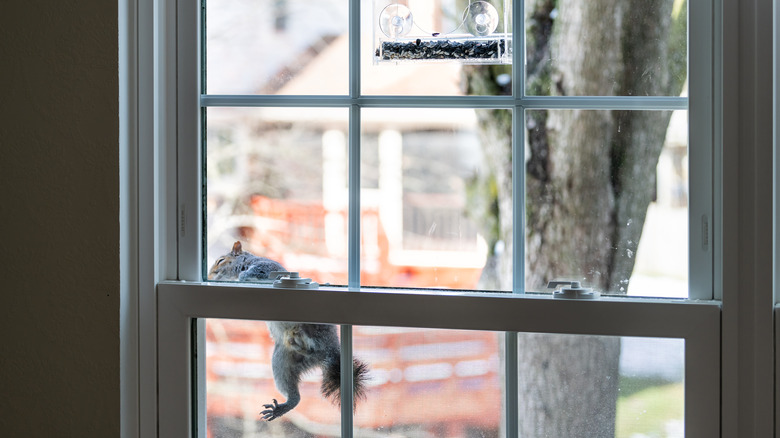8 Ways To Get Rid Of Squirrels
Squirrels may look cute and cuddly, but they can be a real nuisance if they take up residence in your yard. They can dig up your flower bulbs, eat the buds on your fruit trees, consume veggies from your garden, damage electrical wires, burrow into your attic, gnaw on deck furniture, and more, according to The Spruce.
Once you realize you have a squirrel problem, however, figuring out how to get rid of them can be overwhelming. There are seemingly countless ways to deal with squirrels, from chemical solutions to DIY methods to drastic lethal recourse. Read on for eight tried-and-true methods for deterring squirrels from making your property their home — none of which will actually do the critters any harm. This list will feature solutions for keeping squirrels out of a garden, preventing them from entering your home, and stopping them from bringing their furry friends to feast on the edibles you're growing.
1. Don't feed them
This one may seem obvious, but it bears repeating: Do NOT feed the squirrels on your property. As you might imagine, if you feed them, they will consistently return looking for their next meal — and they might even bring friends. According to the RSPCA, squirrels are proficient at procuring their own food, so they don't need help from humans, even if they're looking at you like they haven't had a bite to eat in weeks.
It also might become problematic to feed them, because not only will they act as pests in your garden, but they might actually become reliant on you as a food source. Not to mention, it could lead to an increase in the local squirrel population, with even more critters needing both food and shelter. All that is to say, it's important to inform everyone in your household that squirrels should never be fed under any circumstances.
2. Protect your bird feeder
Even if you're not intentionally feeding your neighborhood squirrels, you may still be inadvertently attracting them to your yard. While bird feeders encourage beautiful birds to visit your property, they may also be acting as a food source for pests like squirrels.
To that end, it's important to carefully plan the placement of your feeders so that squirrels can't access them, per Bob Vila. Make sure they're set up at a distance from trees, telephone poles, and fences as well as anything else a squirrel could easily climb. Also consider buying a squirrel-proof feeder, which is designed specially to keep squirrels out. While squirrels and birds like some of the same foods, there are several type of bird seed that squirrels tend to turn their noses — or snouts — up at. Safflower seeds, nyjer seeds, and white proso millet are tasty to birds, but unappealing to squirrels.
3. Use capsaicin
While keeping food out in the open will attract squirrels, there are some specific scents that will keep them away. Certain smells act as deterrents to squirrels, according to SF Gate, and introducing them to your property will keep the unwanted critters at bay.
Specifically, the Humane Society recommends using capsaicin-based repellents, which smell and taste spicy, which is particularly unappealing to squirrels. These products — which are typically formulated as sprays — can be used to protect garden bulbs or even coat wood patio furniture if squirrels have started to gnaw on it. It's important to note that capsaicin-based products can act as irritants to humans as well, so it's best to wear both eye and skin protection when applying it. While there are capsaicin-coated bird seeds on the market that are safe for birds but unappealing to squirrel, the Humane Society doesn't recommend them as a first line of defense.
4. Block them out
If squirrels have made their way into your home and are causing damage in your attic, you'll need an entirely different strategy. The UK College of Agriculture, Food, and Environment recommends first identifying the potential entry points the squirrels are using. Some of the places they suggest checking are, "eave openings, attic vents, loose flashing around chimneys and pipes and openings around cables." Once these openings have been flagged, they must all be blocked off in order to keep the squirrels out.
Since squirrels have such strong teeth, the materials you use to close up the holes is important. The best options are "1/4 or 1/2-inch hardware cloth or 26 gauge metal," which are thick enough that squirrels shouldn't be able to chew through them. Some sources recommend leaving traps at the major entry points you've identified, but it's best to try humane, non-lethal measures before resorting to that.
5. Coat bulbs with thiram
Beautiful flowers like tulips, crocuses, and daffodils are grown from bulbs, which gardeners lovingly plant to encourage spring-time color. Unfortunately, however, flower bulbs also make a nice meal for squirrels. They often dig them up and eat them, or even rebury them elsewhere as they would with nuts. To that end, The Wildlife Center of Virginia recommends coating the bulbs with a product containing thiram — a fungal pesticide — in order to make them less appealing to squirrels.
If the bulbs have already been planted and can't be soaked, it's prudent to sprinkle the garden bed with bone meal, which acts as a squirrel deterrent. If this doesn't work, gardeners can also switch up the bulbs they choose to plant each season because there are some that squirrels don't seem to enjoy quite as much. Try planting daffodils, grape hyacinths, and crown imperial, none of which are on the list of squirrels' favorite foods.
6. Use vinegar
Whether squirrels are terrorizing your garden or causing damage in your home's interior, there's a readily available household product that may be able to keep them at bay — and you might already have a bottle of it in your pantry. Apple cider vinegar is a useful kitchen staple and makes an excellent addition to salad dressings, but squirrels aren't a fan of the acidic smell or flavor.
To use this product as a squirrel deterrent, purchase a large, value-sized bottle and soak rags with it before strategically placing them wherever squirrels are an issue, suggests SF Gate. They can be tucked into tree branches, positioned near potential attic entry points, or stationed under a deck where squirrels are acting as a nuisance. Unfortunately, the odor will dissipate over time, so the rags will need to be re-soaked periodically. Check them every week or so to ensure they still have a noticeable smell.
7. Protect your trees
Squirrels can wreak havoc on small backyard trees, especially if you're growing tasty fruit. They can stunt the growth of fruit trees by eating the buds before they even get the chance to bloom. They may also gnaw on the bark, which can result in the tree developing a fungal infection, according to Gardening Know How.
There are a number of ways to keep squirrels away from small trees, including applying some of the aforementioned deterrents like capsaicin and thiram. If those don't work, however, a physical — rather than a chemical — solution might be in order. There are a couple of methods to try if squirrels are ravaging your trees. Netting or a metal collar around the trunk may stop them from climbing, and should do the trick in terms of keeping them away since they'll no longer be able to access the tree's fruit or buds.
8. Open a window
If a squirrel somehow enters your home, don't panic. Whether they came in through an open patio door, entered through the attic, or fell down the chimney, the steps to remove them remain the same.
When they find themselves trapped indoors, squirrels may become stressed and will dart around in a large space. The first step is to confine them to a small area, like a bathroom or bedroom, where they can't access the rest of your house, per the Wildlife Center of Virginia. Their instinct will be to leave through a window, so make sure all windows in the space are open and screens have been opened or removed. Then, simply leave the squirrel alone in the room and wait until they find their way out. Even if they're on the second floor of your home, they'll be able to climb onto the roof and make their way to safety.
